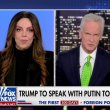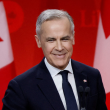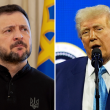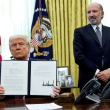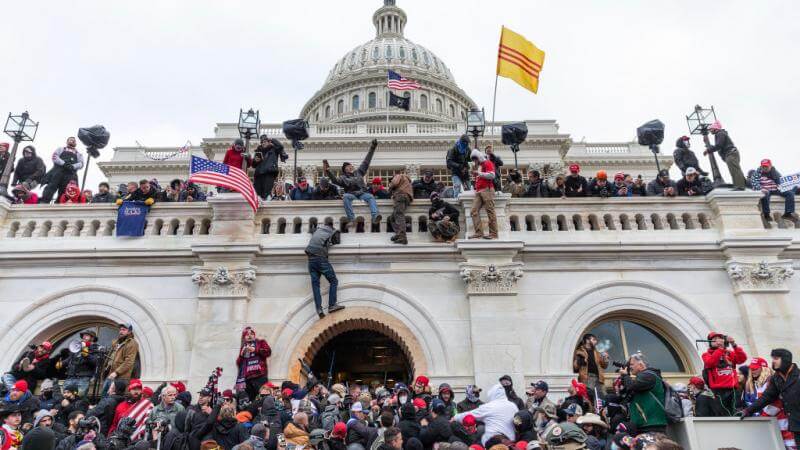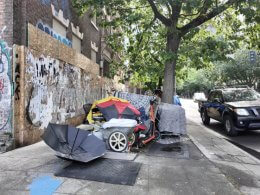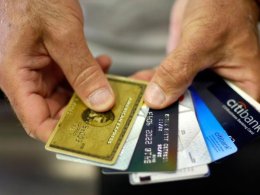Then-President Donald Trump gave clear instructions to Pentagon brass days before the Jan. 6 riots to “do whatever it takes” to keep the U.S. Capitol safe, including deploying National Guard or active-duty troops, but top officials did not comply because of political concerns, according to transcripts of bombshell interviews conducted by the Defense Department's chief watchdog that shine new light on government disfunction ahead of the historic tragedy.
Gen. Mark Milley, the former chairman of the Joints Chief of Staff, confirmed to the Pentagon inspector general three years ago that during a Jan. 3, 2021, Oval Office meeting Trump pre-approved the use of National Guard or active duty troops to keep peace in the nation’s capital on the day Congress was to certify the results of the 2020 election.
Milley's interviews were among several key to transcripts obtained by House Administration Oversight Subcommittee Chairman Barry Loudermilk, R-Ga., and shared with Just the News.
“The President just says, ‘Hey look at this. It’s going to be a large amount of protesters come in here on the 6th, and make sure that you have sufficient National Guard or Soldiers to make sure it’s a safe event,’” Milley told the inspector general in one of two interviews he did in spring 2021 during a probe of the Pentagon’s response to Jan. 6.
Milley said then-Acting Defense Secretary Christopher Miller, himself a former general, assured Trump there was an adequate safety plan for Pentagon assistance to Washington, D.C. “Miller responds by saying, ‘Hey, we’ve got a plan, and we’ve got it covered.’ And that’s about it,” Milley recalled.
"Just make sure it’s safe"
Milley confirmed a second time during the interviews that Trump was clear in his wishes. “It was just what I just described, which was, ‘Hey, I don’t care if you use Guard, or soldiers, active-duty soldiers, do whatever you have to do. Just make sure it’s safe,” the general told the IG.
The transcripts of Milley’s April 8, 2021, and April 16, 2021, interviews confirm reporting by Just the News two years ago that Trump wanted troops to keep the capital city safe.
But other transcripts gathered by Loudermilk during his subcommittee’s ongoing probe of Jan. 6 security failures show civilian leadership at the Pentagon admittedly openly they would not comply with Trump’s wishes, with some saying they did not like the optics of armed soldiers or Guardsmen roaming the Capitol with weapons during what was supposed to be a peaceful transition of power.
“There was absolutely -- there is absolutely no way I was putting U.S. military forces at the Capitol, period,” Miller told the inspector general during his March 2021 interview.
Miller said officials instead used an interagency process to devise an alternative plan that would put some DC National Guard troops on the ground in the nation’s capitol to direct traffic but not to guard the Capitol, a plan that District of Columbia Mayor Muriel Bowser suggested.
“The operational plan was this, let’s take the D.C. National Guard, keep them away from the Capitol. Let’s put -- the request, it wasn’t my request, Bowser and her Metropolitan Police Department were like ‘Let’s put D.C. National Guard on traffic control points and at the Metro stations to free up credentialed law-enforcement officers that can go out and arrest people,’” Miller explained.
Miller admitted there was a political calculus to his decision not to deploy troops near or at the Capitol ahead of time for preventative security.
“I hate to use the word optics because it’s been used and so prejudicially and negatively. It wasn’t the optics. It was like there was would have been huge political consequences that, because that’s what I got paid to do. Is I had the factor in the politics of this and that was my concern is the situation does not warrant at this time U.S. military forces,” he explained.
Pentagon refused to assist D.C. Police
Former District of Columbia Metropolitan Police Chief Robert Contee confirmed in his interview that Pentagon officials, specifically Army Secretary Ryan McCarthy, resisted his department’s initial request around New Year’s Eve for troops in advance of Jan. 6, especially if they were to be deployed anywhere near the Capitol.
“I received a call directly from the Secretary of the Army Ryan McCarthy and at that time -- at that point he had reviewed our request for the support of D.C. National Guard, and what he relayed to me this phone call was not what I initially thought that he would saying,” Contee recounted in his interview. “He did not initially say, ‘Yes, you get the National Guard responding and they’re going to handle this traffic and crowd management that you asked for that they’re going to be responding to handle it.’
“That was not what was stated. What was stated to me was that he was not inclined to fulfill the request with Guardsmen simply because the optics of it was bad,” Conte added. “He said that he did not want to have boots on the ground on the -- he didn’t want to have boots on the ground anywhere near the Capitol is what was stated.”
Loudermilk said he is deeply concerned that Pentagon officials substituted their own personal politics for the president’s instructions.
“President Trump directed senior DoD leaders to ensure events on J6 be safe. They ignored his guidance, prioritized optics concerns over security, and pushed a flawed narrative in their IG report,” he wrote on the X social platform last week. “The American people deserve the full truth.”
Eventually, the Pentagon approved less than 400 DC Guard troops to be used on traffic control. But documents gathered by Loudermilk’s team show the DC Guard was told directly by McCarthy it could not use weapons or engage with protesters, a limitation that became magnified when violence broke out.
“DCNG are not authorized to perform any additional tasks or duties not authorized in this memorandum,” McCarthy’s staff wrote the National Guard commander on Jan. 5, 2021. “In addition, without my personal authorization, the DCNG is not authorized the following: a,) to be issued weapons, ammunition, bayonets, and batons. (Removed body armor and helmets)
“Addition: DCNG Soldiers have the inherent right to self‐defense. DCNG Soldiers will store their helmets and body armor within vehicles or buildings in close proximity to their positions. In the event of an elevation of the threat requiring immediate donning of this equipment for self‐defense, DCNG leadership will immediately notify the Secretary of Army,” that email read.
Subsequently, on the afternoon of Jan. 6 when violence broke out, the Pentagon would eventually deploy hundreds more though it took hours to get them to reach the Capitol, a delay that frustrated Capitol Police.
The DC Homeland Security Coordinator Christopher Rodriguez told the Pentagon inspector general that the same concerns about political optics that nixed troops at the Capitol ahead of time may have factored into the delay on the afternoon of Jan. 6, noting a top Army official used the word “optics” during a call as emergency resources were being urgently sought to quell the violence at the Capitol.
“I do believe it was one of the generals that was on the line from Secretary of Army staff that I referred to,” Rodriquez recalled.
When pressed about what he heard on the call, Rodriguez said: “It shocked me quite frankly. And we recognize that we might not be able to get an answer to getting needed support up to the Capitol in a timely fashion”
The Pentagon IG ultimately concluded the Pentagon acted quickly after violence broke out, noting Miller signed an order to approve troops to the capitol within 45 minutes of the request for help.
"Optics"
But Loudermilk has since challenged that assertion publicly, including in interviews with The Washington Times, noting there were other delays after the order that kept troops from arriving until sundown.
“The DC National Guard was significantly delayed from deploying to the U.S. Capitol on J6 because senior DoD leaders had 'optics' concerns,” Loudermilk wrote on X earlier this month.
The transcripts also show there remain some factual disputes among key players.
For instance, ex-Defense Secretary Miller told Congress that Trump gave a specific number of troops he wanted to see made available for security ahead of Jan. 6.
“The President commented that they were going to need 10,000 troops the following day…I interpreted it as a bit of presidential banter or President Trump banter that you all are familiar with, and in no way, shape, or form did I interpret that as an order or direction," Miller testified.
But Milley, the former Joint Chiefs chairman, said he did not recall that number ever being uttered in the meetings with Trump. "There was no discussion of 10,000 troops," the retired four-star general said.
The transcripts also provide some hints that top Pentagon officials personally disliked the 45th president. For instance, former Acting Secretary Miller at one point compared the former president to Cuba’s most infamous communist leader, the late Fidel Castro.
“Everyone was like, ‘Did you listen to the President’s speech?’ I’m like, ‘The guy speaks for 90 minutes, it’s like Castro or something. No. I’ve got work to do,” Miller told the IG at one point.
Related Story: ‘Totally Failed:’ Pelosi Admitted in Secret Video She Should Have Sought National Guard for J6


